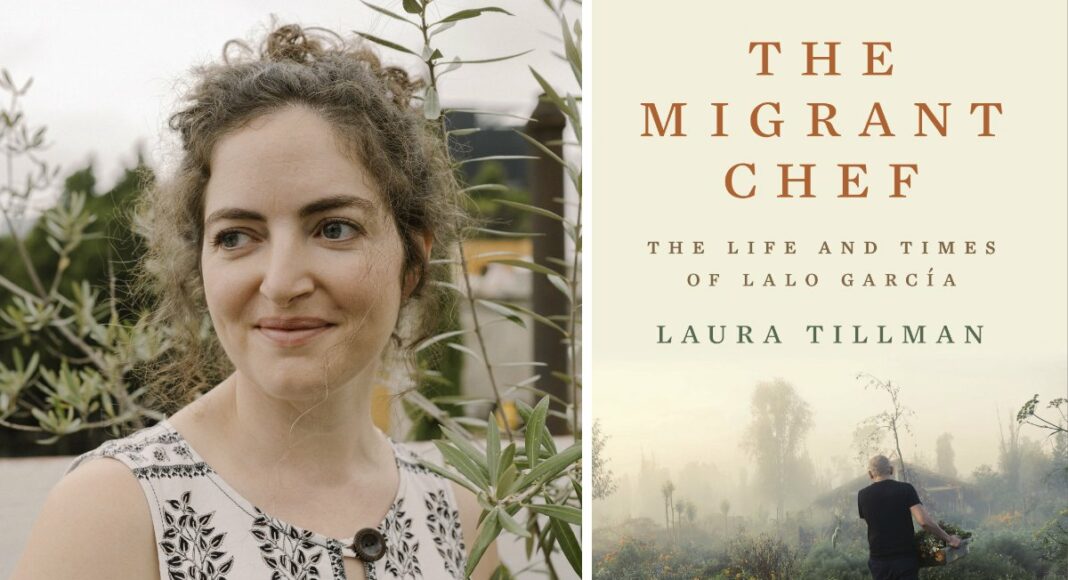The late Anthony Bourdain once said that in his 30 years of cooking professionally, in every restaurant he stepped in it was always a Mexican cook who taught him the ropes.
But their stories are rarely told.
In 2016, Laura Tillman phoned Maximo Bistrot, the renowned Mexico City restaurant, to interview Chef Lalo Garcia hoping to write a story about the cooks and dishwashers struggling in a city rife with inequality. What resulted was five years immersed in Garcia’s world as he brought to life a story familiar to many who immigrated to the United States in search of opportunity.
In “The Migrant Chef”, Garcia’s story is one of redemption. In a one-in-a-million twist of fate, he went from a migrant on the fruit picking trails, to doing time in prison to eventually being one of the most renowned contemporary chefs.
Throughout her research, Tillman traveled between Mexico and the United States, piecing together the story of Garcia and those like him that find themselves not merely in the belly of the beast, but working to feed it with their labor. Tillman recounts the political boiling point that was 2016, when Mexican immigrants in the U.S. were exploited both in the fields and on t.v., being used as scapegoats for a nation’s problems.
In that year, Garcia reached a crossroads, as he negotiated how to exist as an elite chef while also knowing the struggles of those starting from the bottom.
Good Times caught up with Tillman to talk about her book and about her current speaking tour.
Good Times: How has the reception been for this book so far?
Laura Tillman: It’s been good. I’ve been really pleased to see so many people connecting with it in different ways. I think whether it’s as a food piece; or the immigration aspect of it; or people who are familiar with Lalo already; or people […], there are a lot of different ways that people have come to it. It’s a very human story about a really interesting person. And that’s even more universal than any of the subjects that are connected to the book.
GT: Actually, that leads into another question too. So the book has gained a lot of traction within culinary circles and outlets such as New York Times Cooking. However, the book has different aspects to it. And one of the main aspects of it is political. So can you tell me more about the transcendental quality of the story here?
LT: I think, on the one hand, when I first met Lalo I just was interested in him as a person, as a successful chef who had had this really interesting life story. And when I was writing it, I didn’t want it to be a book about a single issue. I didn’t want to try to shoehorn his whole life into being about a certain immigration policy or something like that. But at the same time, I think that there’s a way that we do often hear stories about chefs and cooking, and we know […] that a lot of the chefs and the cooks who are making our food are immigrants from Mexico a lot of the time.
But […] I also think that we don’t always hear the stories of those people behind the scenes. And then even more so people who’ve worked in agriculture; the migrants who are picking food in the United States. So I think that it’s a human story, but it also at the same time is illuminating of larger policies and systems related to the United States, Mexico, food and immigration.
For Lalo when I first met him, it was during the 2016 presidential campaign, and Donald Trump was on the trail talking about people coming from Mexico who are bringing drugs. “They’re rapists, and some, I assume, are good people.” And I remember that campaign speech happening around the time that I met Lalo and meeting this person who in some ways fit this stereotype, in terms of the fact that he’d been convicted of a crime and he’d been deported. But he was also this really inspirational figure in Mexico. So I think that his story is flying in the face of some of those stereotypes that we hear in our politics about who migrants are or what it means to have been incarcerated, and what kind of person you’re supposed to be if you fit in those categories.
GT: How was working on this book different from your previous work?
LT: I think the process was a little different. In this book I was writing about someone who I know is a well-known figure. I had been working on it for a couple of years by the time I actually sold the book proposal, but I had a sense that hopefully more people were going to read it. It was going to be out there and so I think that was something I was thinking about in terms of the way to tell his story.
it’s just really rare to find someone like Lalo […] who has all of those experiences. When he’s speaking about these things, he is drawing from a life that includes both being the worker in the fields and being the person who flies to Paris for the weekend to eat at some restaurant and flies back home again. He’s living in those two worlds. That’s beyond what I think most people experience in a lifetime.
Laura Tillman will be holding a free in store book event at Omnivore Books in San Francisco on Sunday Oct. 15 at 3 pm. She will be in conversation with Lauren Markham, author of the “The Far Way Brothers” and there will be mezcal tasting courtesy of Tahona Mercado.













